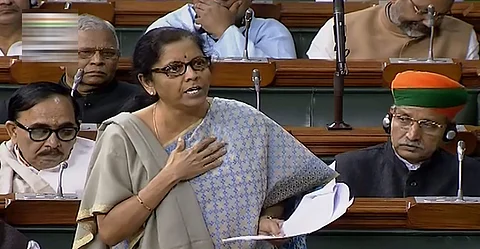

NEW DELHI: The Centre in the Lok Sabha on Monday moved the Taxation Laws (Amendment) Bill 2019 for its passage, seeking changes in the Income Tax law aimed at lowering tax rate options to domestic companies to promote growth and investment and attract fresh investment in the manufacturing sector.
The Bill seeking amendment to the Income-Tax Act, 1961 and to amend the Finance (No.2) Act, 2019 was moved in the House by Finance Minister Nirmala Sitharaman.
The Taxation Laws (Amendment) Ordinance, 2019 was promulgated on September 20 to amend the IT Act and the Finance (No. 2) Act, 2019. It provides lower tax rate options to domestic companies to promote growth and investment and attract fresh investment in the manufacturing sector.
The Bill was introduced in the House on November 25. Some provisions of the Bill are different from those of the Ordinance.
Currently, domestic companies with an annual turnover of up to Rs 400 crore pay income tax at the rate of 25 per cent. For other domestic companies, the tax rate is 30 per cent. The Bill provides domestic companies with an option to pay tax at the rate of 22 per cent, provided they do not claim certain deductions under the Income Tax Act.
The Bill provides new domestic manufacturing companies with an option to pay income tax at the rate of 15 per cent, provided they do not claim certain deductions. These new domestic manufacturing companies must be set up and registered after September 30, 2019 and start manufacturing before April 1, 2023.
A company can choose to opt for the new tax rates in the financial year 2019-20 (assessment year 2020-21) or in any other financial year in the future. Once a company exercises this option, the chosen provision will apply for all subsequent years.
Provisions regarding payment of Minimum Alternate Tax (MAT) will not apply to companies opting for the new tax rates.
MAT is the minimum amount of tax required to be paid by a company, in case its normal tax liability after claiming deductions falls below a certain limit. The Bill adds that the provisions regarding MAT credit will also not apply to companies opting for the new rates.
The Ordinance reduces the MAT rate (applicable for companies not opting for the new tax rates) from 18.5 per cent to 15 per cent with effect from the financial year 2019-20. The Bill amends this provision by making it effective from the financial year 2020-21.